
Mulla Effendi
Encyclopedia
Mulla Abu Bakr Effendi, also Mulla Effendi (also spelled Mala Afandi), also Abu Bakr IIII or Küçük Mulla (1863 - December 31, 1942) was a senior Kurdish
Muslim
cleric, Islamic philosopher, scholar
, astronomer
, politician
, and a prominent Iraqi personality from Arbil
, Iraq
.
Mulla Effendi was born into a respected and intellectual family of Islamic scholars who settled in Arbil in the 16th century and spent most of their life learning and teaching Islamic studies
at the Great Mosque at the Citadel of Arbil
. His family was well-known for their piety and learning and influential throughout Kurdistan for hundred years before him.
After being educated at the Great Mosque, Mulla Effendi like his ancestors spent most of his time teaching and learning there. During his life he granted more than hundred scientific licenses for scholars from different parts of Iraq, Iran
, and the Middle East
in general, and sponsored the daily living and study costs of his students. He also contributed to establishing many schools and mosques in Arbil and in many villages.
He became one of the most influential figures in Kurdistan in the late 19th century and until his death. He had an important role in disengaging tribal conflicts during the Ottoman
rule where he received the highest recognition by the Ottoman Sultan Abdul Hamid II
.
Throughout the British Mandate and after the creation of Iraq
, he played a prominent role in inspiring and directing public opinion, as well as being deeply involved in the political process of the region. In 1924, he strongly urged appending Mosul
Wilayah
to Iraq in his meeting with the members of the League of Nations
commission. He also advocated for the rights of the Christian
inhabitants of Ankawa
. In the events of 1941, the Iraqi royal family chose his house as the most suitable and safe for their stay, and when King Faisal II
returned, he awarded him "Wisam al-Rafidain" of the first order as a reward for his services for his country. He also received many honors and tributes both during and after his life and several places have been named after him.
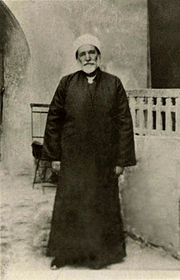 Mulla Abu Bakr Effendi's family is traced back to a known family that emigrated from Iran
Mulla Abu Bakr Effendi's family is traced back to a known family that emigrated from Iran
along with other families during the 16th century at the time of Shah Ismail I Safawi
of Iran and settled in Arbil. The reason for the emigration was due to differences between the chief leader of the family and the ruling Shah.
For several generations before him, his ancestors were famous scholars teaching Islamic studies
at the Great Mosque
at the Citadel of Arbil
. They were widely known and respected throughout Kurdistan for their piety and knowledge. He was named "Küçük Mulla" or "Malla i Gichka" (that means "Little Mulla") after his grandfather Abu Bakr III Effendi (1778–1855) who was known by that name because he completed his study of Islamic sciences in a record period as no one had done before in that age.
Mulla Effendi received his education from his father, Hajji
Omer Effendi, who was the speaker of the Great Mosque. Mulla Effendi's passion for study and learning led him to start teaching and writing when he was young. He was only twenty eight years when he took his father's place after his father's death in 1891.
In 1908, Mulla Effendi renovated the Great Mosque. He taught Islamic philosophy
, Islamic history
, science
, mathematics
, astronomy
and ethics
. Only he could issue Fatwas
in Arbil and for nearby tribes and villages where he granted more than hundred scientific licenses for scholars from different parts of Iraq, Iran, and the Middle East
in general.
Mulla Effendi's whole family were consumptive, and he lost two wives and three daughters through this complaint. He was married four times during his life, and left two sons and three daughters. In 1913, he moved from his house at the citadel to his new house in Badawa (3 km southeast of the citadel, at (36°10′14.04"N 44°02′12.13"E), after its completion.
, Mulla Effendi's family had a significant role in disengaging public conflicts and settling disputes between Kurdish tribes. At one time, Sultan Abdul Hamid II
requested Mulla Effendi's help to settle a conflict between two large Kurdish tribes. Mulla Effendi used his influence to reconcile the two tribes.
For his achievement, Sultan Abdul Hamid II granted him the "Servant of the Two Shrines" medal. It was considered the second highest rank Order of the Ottoman Empire.
, following the arrival of the British troops into Iraq, the country was in a state of anarchy. Mulla Effendi gathered the tribal leaders and urged them to refrain from taking any action that would compromise the stability of the country. Lieut.-Colonel Sir William Rupert Hay, the British Political Officer of Arbil, and author of "Two Years in Kurdistan, Experiences of a Political Officer 1918-1920", described Mulla Effendi's role in inspiring and directing the public opinion, and in talking to the tribal chiefs over to a reasonable attitude. He described Mulla Effendi in his book as the following:
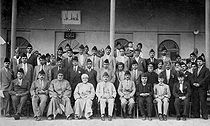
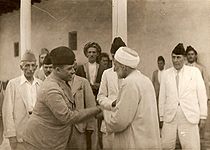
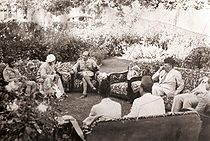
Also, in his book, he wrote:

.jpg) Gertrude Bell
Gertrude Bell
had often visited Mulla Effendi at his house in Badawa, and mentioned him in her letters to her father published in 1927, a year after her death by her stepmother in two volumes.
A.M. Hamilton, who was notable for building the Hamilton Road through Kurdistan, described him in his book published in 1937 "Road through Kurdistan". Also, Lieut.-Colonel Sir Wallace A. Lyon, the predecessor of Lieut.-Colonel Sir William Rupert Hay, described Mulla Effendi's status in his autobiography (1918–44):
In 1924 at the time when the dispute between Iraq and Turkey over the control of the former Ottoman province of Mosul
was under discussion by the League of Nations
, the members of the League of Nations Commission visited Mulla Effendi at his house in Badawa to discuss the issue with him. At the meeting, he strongly supported annexing Mosul to Iraq and stressed the rights of the Kurdish population.
.jpg) In December 1924 and June 1931, King Faisal I visited Mulla Effendi in his house in Badawa in Arbil and thanked him for his efforts and his calls for reconciliation and peace to the different groups in the region.
In December 1924 and June 1931, King Faisal I visited Mulla Effendi in his house in Badawa in Arbil and thanked him for his efforts and his calls for reconciliation and peace to the different groups in the region.
King Faisal I was quoted as describing Mulla Effendi to his brother by saying:
. The Archbishop and town chiefs went to meet Mulla Effendi at the Great Mosque to explain the situation to him and make him aware of rising tensions in Ankawa. Mulla Effendi immediately gathered the tribal leaders in Arbil and informed tribesmen that he would consider any attack against Christians as an attack against him. With those words, he prevented any further attempts of taking over Christian lands in Ankawa.
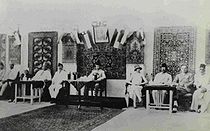
, before British troops entered Baghdad
, and before the collapse of Rashid Ali Al-Gaylani government, Rashid Ali phoned Mulla Effendi and informed him that he had chosen his house as a safe haven for the royal family to stay until the conflict ended. King Faisal II
, Queen Alia, members of the royal family, and court escorts and servants left Baghdad on May 28, 1941 to stay at Mulla Effendi's house at Badawa. He opened his house to them and moved his family to an other house at the citadel. He invited tribal leaders to Badawa to express solidarity with the royal family. On June 3, 1941, two days after the return of Regent Abd al-Ilah
from Habbaniyah
to Baghdad, the royal family left Badawa and returned to Baghdad.
On his return to Baghdad, King Faisal II decorated Mulla Effendi with Wisam al-Rafidain "the Medal of the Two Rivers" in recognition of his work for the country.
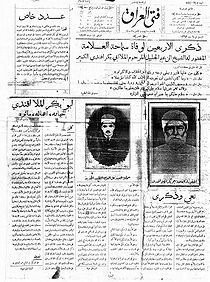
, the Iraqi Premier then Nuri as-Said
, the British Ambassador to Iraq in Baghdad Sir Kinahan Cornwallis
, the President of the Senate
Sayyid Muhammad al-Sadr, Mutasarrif of Mosul Abdul-Majeed al-Yaqubi, Jamil al-Midfai
(served five times as Prime Minister of Iraq), Dawud al-Haidary (well-known Iraqi statesman), paid tribute to his family.
Well-known scholars who studied from Mulla Effendi included: Sheikh Mustafa al-Naqishbandi, Wahbatallah Effendi, Mulla Abdullah Mariwani, Sayyid Abdullah Effendi Mukiryani, Abdulfattah Effendi Shwani, Sheikh Muhammad al-Khal, al-Haj Mulla Muhammad al-Sudani, Sheikh Arif Ashnawi, Muhammad Tajaddin al-Talshi, Mulla Muhammad al-Sawij Bolaqi, Mulla Muhammad al-Saqzi, Mulla Abdullah al-Burhani, al-Mulla Abdullfattah al-Khati, al-Haj Mulla Salih Koza Banka, and other well-known scholars.
His scientific and religious works are well-known and available in the schools of Arbil. He contributed to establishing many schools and mosques in Arbil and in many villages. He also sponsored the costs of living and studying of his students at the Great Mosque. Each year, he had the right to send two students to al-Azhar
in Cairo to pursue their studies. He maintained strong relationships with senior scholars from Egypt
, Turkey
, Afghanistan
, and other places.
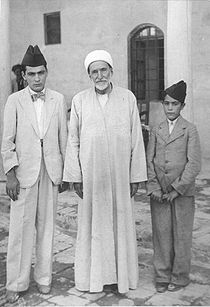
"Explanation of the Quran", Hadith
"Traditions of the Prophet", linguistics, doctrine, logic, literature.
In the mid 1960s, a fire destroyed the library at Badawa and a lot of the books in that library were lost. The books that were at the citadel library of and some at the Badawa library are preserved to this day, while the majority of manuscripts are at Dar al-Makhtutat al-Iraqiyya / the Iraqi House of Manuscripts (formerly Dar Saddam lil-Makhtutat / Saddam
House of Manuscripts).

.jpg)
Kurdish people
The Kurdish people, or Kurds , are an Iranian people native to the Middle East, mostly inhabiting a region known as Kurdistan, which includes adjacent parts of Iran, Iraq, Syria, and Turkey...
Muslim
Muslim
A Muslim, also spelled Moslem, is an adherent of Islam, a monotheistic, Abrahamic religion based on the Quran, which Muslims consider the verbatim word of God as revealed to prophet Muhammad. "Muslim" is the Arabic term for "submitter" .Muslims believe that God is one and incomparable...
cleric, Islamic philosopher, scholar
Ulema
Ulama , also spelt ulema, refers to the educated class of Muslim legal scholars engaged in the several fields of Islamic studies. They are best known as the arbiters of shari‘a law...
, astronomer
Astronomer
An astronomer is a scientist who studies celestial bodies such as planets, stars and galaxies.Historically, astronomy was more concerned with the classification and description of phenomena in the sky, while astrophysics attempted to explain these phenomena and the differences between them using...
, politician
Politician
A politician, political leader, or political figure is an individual who is involved in influencing public policy and decision making...
, and a prominent Iraqi personality from Arbil
Arbil
Arbil / Hewlêr is the fourth largest city in Iraq after Baghdad, Basra and Mosul...
, Iraq
Iraq
Iraq ; officially the Republic of Iraq is a country in Western Asia spanning most of the northwestern end of the Zagros mountain range, the eastern part of the Syrian Desert and the northern part of the Arabian Desert....
.
Mulla Effendi was born into a respected and intellectual family of Islamic scholars who settled in Arbil in the 16th century and spent most of their life learning and teaching Islamic studies
Islamic studies
In a Muslim context, Islamic studies can be an umbrella term for all virtually all of academia, both originally researched and as defined by the Islamization of knowledge...
at the Great Mosque at the Citadel of Arbil
Citadel of Arbil
The Citadel of Arbil is a tell or occupied mound, and the historical city centre of Arbil in Iraq. It has been claimed that the site is the oldest continuously inhabited town in the world....
. His family was well-known for their piety and learning and influential throughout Kurdistan for hundred years before him.
After being educated at the Great Mosque, Mulla Effendi like his ancestors spent most of his time teaching and learning there. During his life he granted more than hundred scientific licenses for scholars from different parts of Iraq, Iran
Iran
Iran , officially the Islamic Republic of Iran , is a country in Southern and Western Asia. The name "Iran" has been in use natively since the Sassanian era and came into use internationally in 1935, before which the country was known to the Western world as Persia...
, and the Middle East
Middle East
The Middle East is a region that encompasses Western Asia and Northern Africa. It is often used as a synonym for Near East, in opposition to Far East...
in general, and sponsored the daily living and study costs of his students. He also contributed to establishing many schools and mosques in Arbil and in many villages.
He became one of the most influential figures in Kurdistan in the late 19th century and until his death. He had an important role in disengaging tribal conflicts during the Ottoman
Ottoman Empire
The Ottoman EmpireIt was usually referred to as the "Ottoman Empire", the "Turkish Empire", the "Ottoman Caliphate" or more commonly "Turkey" by its contemporaries...
rule where he received the highest recognition by the Ottoman Sultan Abdul Hamid II
Abdul Hamid II
His Imperial Majesty, The Sultan Abdülhamid II, Emperor of the Ottomans, Caliph of the Faithful was the 34th sultan of the Ottoman Empire...
.
Throughout the British Mandate and after the creation of Iraq
History of Iraq
Iraq, known in Classical Antiquity as Mesopotamia, was home to some of the oldest civilizations in the world, with a cultural history of over 10,000 years. hence its common epithet, the Cradle of Civilization. Mesopotamia, as part of the larger Fertile Crescent, was a significant part of the...
, he played a prominent role in inspiring and directing public opinion, as well as being deeply involved in the political process of the region. In 1924, he strongly urged appending Mosul
Mosul
Mosul , is a city in northern Iraq and the capital of the Ninawa Governorate, some northwest of Baghdad. The original city stands on the west bank of the Tigris River, opposite the ancient Assyrian city of Nineveh on the east bank, but the metropolitan area has now grown to encompass substantial...
Wilayah
Wilayah
A wilāyah or vilâyet , or vilayat in Urdu and Turkish, is an administrative division, usually translated as "province", rarely as "governorate". The word comes from the Arabic "w-l-y", "to govern": a wāli — "governor" — governs a wilayah, "that which is governed"...
to Iraq in his meeting with the members of the League of Nations
League of Nations
The League of Nations was an intergovernmental organization founded as a result of the Paris Peace Conference that ended the First World War. It was the first permanent international organization whose principal mission was to maintain world peace...
commission. He also advocated for the rights of the Christian
Christian
A Christian is a person who adheres to Christianity, an Abrahamic, monotheistic religion based on the life and teachings of Jesus of Nazareth as recorded in the Canonical gospels and the letters of the New Testament...
inhabitants of Ankawa
Ankawa
Ankawa , is an Iraqi Christian town of about 30,000 people, in practice a suburb of Arbil, Erbil Governorate in Iraqi Kurdistan, northern Iraq...
. In the events of 1941, the Iraqi royal family chose his house as the most suitable and safe for their stay, and when King Faisal II
Faisal II of Iraq
Faisal II was the last King of Iraq. He reigned from 4 April 1939 until July 1958, when he was killed during the "14 July Revolution" together with several members of his family...
returned, he awarded him "Wisam al-Rafidain" of the first order as a reward for his services for his country. He also received many honors and tributes both during and after his life and several places have been named after him.
Early life and family

Iran
Iran , officially the Islamic Republic of Iran , is a country in Southern and Western Asia. The name "Iran" has been in use natively since the Sassanian era and came into use internationally in 1935, before which the country was known to the Western world as Persia...
along with other families during the 16th century at the time of Shah Ismail I Safawi
Ismail I
Ismail I , known in Persian as Shāh Ismāʿil , was a Shah of Iran and the founder of the Safavid dynasty which survived until 1736. Isma'il started his campaign in Azerbaijan in 1500 as the leader of the Safaviyya, an extremist heterodox Twelver Shi'i militant religious order and unified all of Iran...
of Iran and settled in Arbil. The reason for the emigration was due to differences between the chief leader of the family and the ruling Shah.
For several generations before him, his ancestors were famous scholars teaching Islamic studies
Islamic studies
In a Muslim context, Islamic studies can be an umbrella term for all virtually all of academia, both originally researched and as defined by the Islamization of knowledge...
at the Great Mosque
Mosque
A mosque is a place of worship for followers of Islam. The word is likely to have entered the English language through French , from Portuguese , from Spanish , and from Berber , ultimately originating in — . The Arabic word masjid literally means a place of prostration...
at the Citadel of Arbil
Citadel of Arbil
The Citadel of Arbil is a tell or occupied mound, and the historical city centre of Arbil in Iraq. It has been claimed that the site is the oldest continuously inhabited town in the world....
. They were widely known and respected throughout Kurdistan for their piety and knowledge. He was named "Küçük Mulla" or "Malla i Gichka" (that means "Little Mulla") after his grandfather Abu Bakr III Effendi (1778–1855) who was known by that name because he completed his study of Islamic sciences in a record period as no one had done before in that age.
Mulla Effendi received his education from his father, Hajji
Hajji
Hajji or El-Hajj, is an honorific title given to a Muslim person who has successfully completed the Hajj to Mecca, and is often used to refer to an elder, since it can take time to accumulate the wealth to fund the travel. The title is placed before a person's name...
Omer Effendi, who was the speaker of the Great Mosque. Mulla Effendi's passion for study and learning led him to start teaching and writing when he was young. He was only twenty eight years when he took his father's place after his father's death in 1891.
In 1908, Mulla Effendi renovated the Great Mosque. He taught Islamic philosophy
Islamic philosophy
Islamic philosophy is a branch of Islamic studies. It is the continuous search for Hekma in the light of Islamic view of life, universe, ethics, society, and so on...
, Islamic history
Muslim history
Muslim history is the history of Muslim people. In the history of Islam the followers of the religion of Islam have impacted political history, economic history, and military history...
, science
Science
Science is a systematic enterprise that builds and organizes knowledge in the form of testable explanations and predictions about the universe...
, mathematics
Mathematics
Mathematics is the study of quantity, space, structure, and change. Mathematicians seek out patterns and formulate new conjectures. Mathematicians resolve the truth or falsity of conjectures by mathematical proofs, which are arguments sufficient to convince other mathematicians of their validity...
, astronomy
Astronomy
Astronomy is a natural science that deals with the study of celestial objects and phenomena that originate outside the atmosphere of Earth...
and ethics
Ethics
Ethics, also known as moral philosophy, is a branch of philosophy that addresses questions about morality—that is, concepts such as good and evil, right and wrong, virtue and vice, justice and crime, etc.Major branches of ethics include:...
. Only he could issue Fatwas
Fatwa
A fatwā in the Islamic faith is a juristic ruling concerning Islamic law issued by an Islamic scholar. In Sunni Islam any fatwā is non-binding, whereas in Shia Islam it could be considered by an individual as binding, depending on his or her relation to the scholar. The person who issues a fatwā...
in Arbil and for nearby tribes and villages where he granted more than hundred scientific licenses for scholars from different parts of Iraq, Iran, and the Middle East
Middle East
The Middle East is a region that encompasses Western Asia and Northern Africa. It is often used as a synonym for Near East, in opposition to Far East...
in general.
Mulla Effendi's whole family were consumptive, and he lost two wives and three daughters through this complaint. He was married four times during his life, and left two sons and three daughters. In 1913, he moved from his house at the citadel to his new house in Badawa (3 km southeast of the citadel, at (36°10′14.04"N 44°02′12.13"E), after its completion.
Ottoman Empire
During the Ottoman EmpireOttoman Empire
The Ottoman EmpireIt was usually referred to as the "Ottoman Empire", the "Turkish Empire", the "Ottoman Caliphate" or more commonly "Turkey" by its contemporaries...
, Mulla Effendi's family had a significant role in disengaging public conflicts and settling disputes between Kurdish tribes. At one time, Sultan Abdul Hamid II
Abdul Hamid II
His Imperial Majesty, The Sultan Abdülhamid II, Emperor of the Ottomans, Caliph of the Faithful was the 34th sultan of the Ottoman Empire...
requested Mulla Effendi's help to settle a conflict between two large Kurdish tribes. Mulla Effendi used his influence to reconcile the two tribes.
For his achievement, Sultan Abdul Hamid II granted him the "Servant of the Two Shrines" medal. It was considered the second highest rank Order of the Ottoman Empire.
British mandate
During the beginning of the British mandateBritish Mandate
British Mandate may refer to:*British Mandate for Palestine*British Mandate of Mesopotamia...
, following the arrival of the British troops into Iraq, the country was in a state of anarchy. Mulla Effendi gathered the tribal leaders and urged them to refrain from taking any action that would compromise the stability of the country. Lieut.-Colonel Sir William Rupert Hay, the British Political Officer of Arbil, and author of "Two Years in Kurdistan, Experiences of a Political Officer 1918-1920", described Mulla Effendi's role in inspiring and directing the public opinion, and in talking to the tribal chiefs over to a reasonable attitude. He described Mulla Effendi in his book as the following:



Also, in his book, he wrote:

.jpg)
Gertrude Bell
Gertrude Margaret Lowthian Bell, CBE was an English writer, traveller, political officer, administrator, and archaeologist who explored, mapped, and became highly influential to British imperial policy-making due to her extensive travels in Greater Syria, Mesopotamia, Asia Minor, and Arabia. Along...
had often visited Mulla Effendi at his house in Badawa, and mentioned him in her letters to her father published in 1927, a year after her death by her stepmother in two volumes.
A.M. Hamilton, who was notable for building the Hamilton Road through Kurdistan, described him in his book published in 1937 "Road through Kurdistan". Also, Lieut.-Colonel Sir Wallace A. Lyon, the predecessor of Lieut.-Colonel Sir William Rupert Hay, described Mulla Effendi's status in his autobiography (1918–44):
In 1924 at the time when the dispute between Iraq and Turkey over the control of the former Ottoman province of Mosul
Mosul
Mosul , is a city in northern Iraq and the capital of the Ninawa Governorate, some northwest of Baghdad. The original city stands on the west bank of the Tigris River, opposite the ancient Assyrian city of Nineveh on the east bank, but the metropolitan area has now grown to encompass substantial...
was under discussion by the League of Nations
League of Nations
The League of Nations was an intergovernmental organization founded as a result of the Paris Peace Conference that ended the First World War. It was the first permanent international organization whose principal mission was to maintain world peace...
, the members of the League of Nations Commission visited Mulla Effendi at his house in Badawa to discuss the issue with him. At the meeting, he strongly supported annexing Mosul to Iraq and stressed the rights of the Kurdish population.
.jpg)
King Faisal I was quoted as describing Mulla Effendi to his brother by saying:
Ankawa Christians
In the early 1920s, a few groups threatened to take over the lands of the indigenous Christian inhabitants of AnkawaAnkawa
Ankawa , is an Iraqi Christian town of about 30,000 people, in practice a suburb of Arbil, Erbil Governorate in Iraqi Kurdistan, northern Iraq...
. The Archbishop and town chiefs went to meet Mulla Effendi at the Great Mosque to explain the situation to him and make him aware of rising tensions in Ankawa. Mulla Effendi immediately gathered the tribal leaders in Arbil and informed tribesmen that he would consider any attack against Christians as an attack against him. With those words, he prevented any further attempts of taking over Christian lands in Ankawa.

1941 Coup d'etat
During the last days of the Anglo-Iraqi WarAnglo-Iraqi War
The Anglo-Iraqi War was the name of the British campaign against the rebel government of Rashid Ali in the Kingdom of Iraq during the Second World War. The war lasted from 2 May to 31 May 1941. The campaign resulted in the re-occupation of Iraq by British armed forces and the return to power of the...
, before British troops entered Baghdad
Baghdad
Baghdad is the capital of Iraq, as well as the coterminous Baghdad Governorate. The population of Baghdad in 2011 is approximately 7,216,040...
, and before the collapse of Rashid Ali Al-Gaylani government, Rashid Ali phoned Mulla Effendi and informed him that he had chosen his house as a safe haven for the royal family to stay until the conflict ended. King Faisal II
Faisal II of Iraq
Faisal II was the last King of Iraq. He reigned from 4 April 1939 until July 1958, when he was killed during the "14 July Revolution" together with several members of his family...
, Queen Alia, members of the royal family, and court escorts and servants left Baghdad on May 28, 1941 to stay at Mulla Effendi's house at Badawa. He opened his house to them and moved his family to an other house at the citadel. He invited tribal leaders to Badawa to express solidarity with the royal family. On June 3, 1941, two days after the return of Regent Abd al-Ilah
'Abd al-Ilah
Crown Prince Abd al-Ilāh of Hejaz, GCB, GCMG, GCVO was a cousin and brother-in-law of King Ghazi of the Kingdom of Iraq. Abdul Ilah served as Regent for King Faisal II from April 4, 1939 to May 2, 1953, when Faisal came of age...
from Habbaniyah
Habbaniyah
Al Habbaniyah or Habbaniya is a city in Al-Anbar Province, in central Iraq.-References:...
to Baghdad, the royal family left Badawa and returned to Baghdad.
On his return to Baghdad, King Faisal II decorated Mulla Effendi with Wisam al-Rafidain "the Medal of the Two Rivers" in recognition of his work for the country.

Death and legacy
Abu Bakr Mulla Effendi died on Thursday December 31, 1942. He was buried in the family's private cemetery in Badawa. His death was a sad loss to many. Highest ranking members of the government and others such as Deputy Chief of Royal Protocol on behalf of Regent Abd al-Ilah'Abd al-Ilah
Crown Prince Abd al-Ilāh of Hejaz, GCB, GCMG, GCVO was a cousin and brother-in-law of King Ghazi of the Kingdom of Iraq. Abdul Ilah served as Regent for King Faisal II from April 4, 1939 to May 2, 1953, when Faisal came of age...
, the Iraqi Premier then Nuri as-Said
Nuri as-Said
Nuri Pasha al-Said was an Iraqi politician during the British Mandate and during the Kingdom of Iraq. He served in various key cabinet positions, and served seven terms as Prime Minister of Iraq....
, the British Ambassador to Iraq in Baghdad Sir Kinahan Cornwallis
Kinahan Cornwallis
Sir Kirnahan Cornwallis, GCMG, CBE, DSO was a British administrator and diplomat best known for being an advisor to King Faisal and for being the British Ambassador to the Kingdom of Iraq during the Anglo-Iraqi War.-Biography:...
, the President of the Senate
Senate
A senate is a deliberative assembly, often the upper house or chamber of a legislature or parliament. There have been many such bodies in history, since senate means the assembly of the eldest and wiser members of the society and ruling class...
Sayyid Muhammad al-Sadr, Mutasarrif of Mosul Abdul-Majeed al-Yaqubi, Jamil al-Midfai
Jamil al-Midfai
Jamil al-Midfai was an Iraqi politician. He served as that country's prime minister on five separate occasions:# November 9, 1933 – August 25, 1934# March 1, 1935 – March 16, 1935...
(served five times as Prime Minister of Iraq), Dawud al-Haidary (well-known Iraqi statesman), paid tribute to his family.
Well-known scholars who studied from Mulla Effendi included: Sheikh Mustafa al-Naqishbandi, Wahbatallah Effendi, Mulla Abdullah Mariwani, Sayyid Abdullah Effendi Mukiryani, Abdulfattah Effendi Shwani, Sheikh Muhammad al-Khal, al-Haj Mulla Muhammad al-Sudani, Sheikh Arif Ashnawi, Muhammad Tajaddin al-Talshi, Mulla Muhammad al-Sawij Bolaqi, Mulla Muhammad al-Saqzi, Mulla Abdullah al-Burhani, al-Mulla Abdullfattah al-Khati, al-Haj Mulla Salih Koza Banka, and other well-known scholars.
His scientific and religious works are well-known and available in the schools of Arbil. He contributed to establishing many schools and mosques in Arbil and in many villages. He also sponsored the costs of living and studying of his students at the Great Mosque. Each year, he had the right to send two students to al-Azhar
Al-Azhar University
Al-Azhar University is an educational institute in Cairo, Egypt. Founded in 970~972 as a madrasa, it is the chief centre of Arabic literature and Islamic learning in the world. It is the oldest degree-granting university in Egypt. In 1961 non-religious subjects were added to its curriculum.It is...
in Cairo to pursue their studies. He maintained strong relationships with senior scholars from Egypt
Egypt
Egypt , officially the Arab Republic of Egypt, Arabic: , is a country mainly in North Africa, with the Sinai Peninsula forming a land bridge in Southwest Asia. Egypt is thus a transcontinental country, and a major power in Africa, the Mediterranean Basin, the Middle East and the Muslim world...
, Turkey
Turkey
Turkey , known officially as the Republic of Turkey , is a Eurasian country located in Western Asia and in East Thrace in Southeastern Europe...
, Afghanistan
Afghanistan
Afghanistan , officially the Islamic Republic of Afghanistan, is a landlocked country located in the centre of Asia, forming South Asia, Central Asia and the Middle East. With a population of about 29 million, it has an area of , making it the 42nd most populous and 41st largest nation in the world...
, and other places.

Library
He had two large libraries. One of them was at the Great Mosque, and the other was at Badawa. The libraries were full of references, valuable and rare manuscripts and printed materials. The libraries contained books on language, science, grammar, morphology, rhetoric, TafsirTafsir
Tafseer is the Arabic word for exegesis or commentary, usually of the Qur'an. Ta'wīl is a subset of tafsir and refers to esoteric or mystical interpretation. An author of tafsir is a mufassir .- Etymology :...
"Explanation of the Quran", Hadith
Hadith
The term Hadīth is used to denote a saying or an act or tacit approval or criticism ascribed either validly or invalidly to the Islamic prophet Muhammad....
"Traditions of the Prophet", linguistics, doctrine, logic, literature.
In the mid 1960s, a fire destroyed the library at Badawa and a lot of the books in that library were lost. The books that were at the citadel library of and some at the Badawa library are preserved to this day, while the majority of manuscripts are at Dar al-Makhtutat al-Iraqiyya / the Iraqi House of Manuscripts (formerly Dar Saddam lil-Makhtutat / Saddam
Saddam Hussein
Saddam Hussein Abd al-Majid al-Tikriti was the fifth President of Iraq, serving in this capacity from 16 July 1979 until 9 April 2003...
House of Manuscripts).
Books
- Tafsir "Quran Explanation" (manuscript).
- The AstrolabeAstrolabeAn astrolabe is an elaborate inclinometer, historically used by astronomers, navigators, and astrologers. Its many uses include locating and predicting the positions of the Sun, Moon, planets, and stars, determining local time given local latitude and longitude, surveying, triangulation, and to...
(manuscript). - Algebra "Old Verbal Method" (manuscript).
- Commentaries on "the Attitudes of Public Situations" in explanation of al-Jarjani book.
- Commentaries on (Orbits Law).
- Commentaries on (Astrolabe) book.
- Translated from Turkish "al-Badeea" book, on using the Astrolabe.
- Translations from Turkish and Persian into Kurdish and Arabic.
- Poems in Kurdish, Arabic, Turkish, and Persian.

Honors and tributes
Mulla Effendi received many honors and tributes during his life and posthumously. Many places have been named after him.- "Servant of the Two Holy Shrines" medal of the first order of the Ottoman Empire was granted to Mulla Effendi by Sultan Abdul Hamid IIAbdul Hamid IIHis Imperial Majesty, The Sultan Abdülhamid II, Emperor of the Ottomans, Caliph of the Faithful was the 34th sultan of the Ottoman Empire...
.
- Wisam al-Rafidain (the Medal of the Two Rivers) of the first order was granted by King Faisal II of IraqFaisal II of IraqFaisal II was the last King of Iraq. He reigned from 4 April 1939 until July 1958, when he was killed during the "14 July Revolution" together with several members of his family...
.
- In 1943, the famous Kurdish poet PiramerdPiramerdTawfeq Mahmoud Hamza or Piramerd, , , was a Kurdish poet , writer, novelist and journalist. He was born in the Gwêje neighborhood of Sulaimaniya city in Iraq. In 1926, he became the editor of the Kurdish newspaper Jîyan...
wrote a poem following his death titled "On the death of Mulla Effendi".
- Many famous poets praised Mulla Effendi in their poems, including Sheikh Raza Talabani, Nemat-Allah al-Nema, and Abdul-Rahman al-Bana.
- The Kurdistan Regional GovernmentKurdistan Regional GovernmentThe Kurdistan Regional Government , , is the official ruling body of the predominantly Kurds-populated Kurdistan Region in Northern Iraq...
named a street, a school, and a public health center in Arbil city after him.
.jpg)
Trivia
- Mulla Effendi rarely traveled outside Arbil. The only time he did was to Mosul, to visit the WāliWaliWalī , is an Arabic word meaning "custodian", "protector", "sponsor", or authority as denoted by its definition "crown". "Wali" is someone who has "Walayah" over somebody else. For example, in Fiqh the father is wali of his children. In Islam, the phrase ولي الله walīyu 'llāh...
of Mosul WilayahWilayahA wilāyah or vilâyet , or vilayat in Urdu and Turkish, is an administrative division, usually translated as "province", rarely as "governorate". The word comes from the Arabic "w-l-y", "to govern": a wāli — "governor" — governs a wilayah, "that which is governed"...
, Sulaiman Nadheef (Ottoman Empire then), who was a close friend to his father.
- Mulla Effendi was the first person to own a car in Arbil. He used his car to travel between his house in Badawa and the Great Mosque at the citadel.

